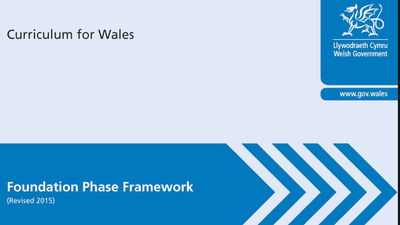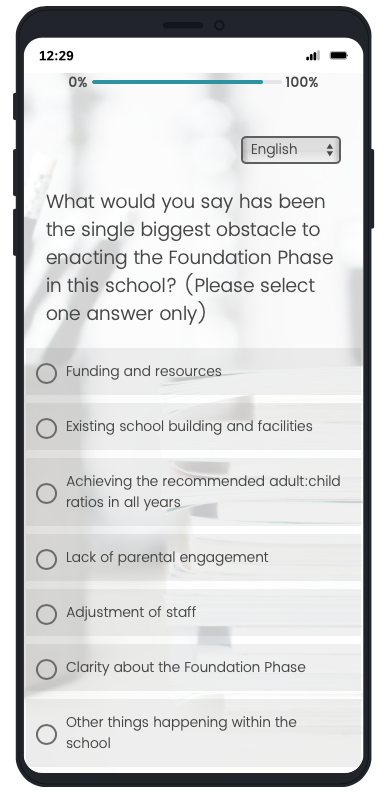Investigating the Foundation Phase
Information for Participants
A 5 year research study conducted as part of a Cardiff University PhD Candidature
Funded by the Welsh Government and Economic and Social Research Council
Summary
Aim of the research
The overarching aim of this research is to examine the success of the Foundation Phase from a number of different angles, now that it has had almost 10 years to embed. The research builds on a national evaluation of the Foundation Phase commissioned by the Welsh Government and published in 2015.
Work with case study schools
An essential component of the Welsh government research, conducted by WISERD (Cardiff University) involved 41 schools and settings across Wales taking part as ‘case studies.’ A number of these schools have been approached to take part in this second smaller study, with the hope of eliciting in-depth views and information on practices. The research aims to find out about how the Foundation Phase is currently implemented in different classrooms in Wales and canvass existing opinion about its strengths, weaknesses and associated challenges, following a longer period of implementation and time for practices to embed. More information about what’s involved for case study schools is described under the case study sections of the website. The key features of the wider research are described below.
Key features of the wider research
A little bit about me, the researcher: Nikki Jones
I am an experienced researcher, have worked within Foundation Phase classrooms on a voluntary basis and have been a primary school governor for over 10 years. I have the required Criminal Records Bureau clearance to work in schools and, when visiting, will carry a university photo identification badge at all times. The research is guided by the director of the original Welsh Government Commissioned Foundation Phase evaluation, Professor Chris Taylor and is supported by a number of experts in the field of educational research. It has been approved by the Cardiff University School of Social Sciences Ethics Committee and will strictly adhere to professional codes of practice. Every care will be taken to ensure that all data pertaining to participants is kept securely, retained for 5 years and destroyed in accordance with GDPR (2018). All participants have the right to withdraw from the research at any time.
Any comments you have concerning my research are valued, please feel free to contact me or ask questions at any stage.
The overarching aim of this research is to examine the success of the Foundation Phase from a number of different angles, now that it has had almost 10 years to embed. The research builds on a national evaluation of the Foundation Phase commissioned by the Welsh Government and published in 2015.
Work with case study schools
An essential component of the Welsh government research, conducted by WISERD (Cardiff University) involved 41 schools and settings across Wales taking part as ‘case studies.’ A number of these schools have been approached to take part in this second smaller study, with the hope of eliciting in-depth views and information on practices. The research aims to find out about how the Foundation Phase is currently implemented in different classrooms in Wales and canvass existing opinion about its strengths, weaknesses and associated challenges, following a longer period of implementation and time for practices to embed. More information about what’s involved for case study schools is described under the case study sections of the website. The key features of the wider research are described below.
Key features of the wider research
- A national survey of Foundation Phase Lead teachers
- Snapshot observations of Foundation Phase practice in a small number of case study schools
- Interviews with Headteachers and Foundation Phase practitioners
- Examination of Foundation Phase outcomes for the whole of Wales
- Interviews with key policy makers and advisors
- Comparison of Headteacher, Foundation Phase practitioner and key stakeholder views in 2011/12 and 2020.
- Comparison of Foundation Phase practice between 2011/12 and 2020
A little bit about me, the researcher: Nikki Jones
I am an experienced researcher, have worked within Foundation Phase classrooms on a voluntary basis and have been a primary school governor for over 10 years. I have the required Criminal Records Bureau clearance to work in schools and, when visiting, will carry a university photo identification badge at all times. The research is guided by the director of the original Welsh Government Commissioned Foundation Phase evaluation, Professor Chris Taylor and is supported by a number of experts in the field of educational research. It has been approved by the Cardiff University School of Social Sciences Ethics Committee and will strictly adhere to professional codes of practice. Every care will be taken to ensure that all data pertaining to participants is kept securely, retained for 5 years and destroyed in accordance with GDPR (2018). All participants have the right to withdraw from the research at any time.
Any comments you have concerning my research are valued, please feel free to contact me or ask questions at any stage.

Case Study Interviews
Why take part in an interview?
Giving a voice to staff who manage or work within the Foundation Phase and have day to day responsibility for its implementation is seen as fundamental to appraising the policy. The interviews aim to find out your views about the Foundation Phase as an educational policy, about its impact and your first-hand experience of the practical issues involved with its delivery. This will enable a deeper understanding of the policy’s strengths and weaknesses and has the potential to help further shape the education of 3-7 year olds in Wales.
What kind of themes will be discussed?
The interviews are likely to touch on the following topics:
How are interviews conducted?
Where possible, the aim is to interview staff in person, but due to current pandemic-related restrictions it is likely that most interviews will be conducted virtually, either using a platform like Zoom or Microsoft Teams (which can be used with the camera on or off, like a telephone interview for those that are camera shy!). Interviews can take place at any time, whatever suits you. This includes evening discussions from the comfort of your sofa with a mug of tea or glass of wine in hand! Alternatively, if preferred, interviews can be carried out via email. This is likely to involve several exchanges in order to fully explore your views and experiences and effectively mimic the interview process.
Where interviews take place in real time, it is very probable that I would like to audio record them so that I can focus on what you’re saying rather than writing notes. However, the recorder can be switched off at any point and if recording makes you feel at all uncomfortable then we can proceed without it from the start. You will be asked to indicate your consent to audio record the interview before we begin and can indicate your preference then.
How information is used?
The research does not assess you as a practitioner. Rather, it is concerned with your experiences and opinions as someone who works in the Foundation Phase. Furthermore, as pseudonyms will be used for all schools and participants in the research, neither you nor your school will be identified in any publication and all information you provide will be treated as strictly confidential and anonymous.
In reporting findings from my research, I may wish to use quotations from your interview, although any quotations used will maintain anonymity. The only identifiable information would be your role (i.e. Year 2 Teacher or Teaching Assistant). If you do not wish for any quotations from the interview to be used, then please let me know. Again, I will be happy to discuss this with you prior to the interview commencing.
All interview data will be stored securely, retained for 5 years and destroyed in accordance with GDPR (2018). All participants have the right to withdraw from the research at any time, without detriment.
Consent
Participants will be asked to sign a consent form at the start of the interview.
Giving a voice to staff who manage or work within the Foundation Phase and have day to day responsibility for its implementation is seen as fundamental to appraising the policy. The interviews aim to find out your views about the Foundation Phase as an educational policy, about its impact and your first-hand experience of the practical issues involved with its delivery. This will enable a deeper understanding of the policy’s strengths and weaknesses and has the potential to help further shape the education of 3-7 year olds in Wales.
What kind of themes will be discussed?
The interviews are likely to touch on the following topics:
- What the Foundation Phase looks like in practice
- Things that influence how the policy is delivered
- Views of its strengths, weaknesses and the impact that it has on learners
- The learning needs of pupils from deprived backgrounds
How are interviews conducted?
Where possible, the aim is to interview staff in person, but due to current pandemic-related restrictions it is likely that most interviews will be conducted virtually, either using a platform like Zoom or Microsoft Teams (which can be used with the camera on or off, like a telephone interview for those that are camera shy!). Interviews can take place at any time, whatever suits you. This includes evening discussions from the comfort of your sofa with a mug of tea or glass of wine in hand! Alternatively, if preferred, interviews can be carried out via email. This is likely to involve several exchanges in order to fully explore your views and experiences and effectively mimic the interview process.
Where interviews take place in real time, it is very probable that I would like to audio record them so that I can focus on what you’re saying rather than writing notes. However, the recorder can be switched off at any point and if recording makes you feel at all uncomfortable then we can proceed without it from the start. You will be asked to indicate your consent to audio record the interview before we begin and can indicate your preference then.
How information is used?
The research does not assess you as a practitioner. Rather, it is concerned with your experiences and opinions as someone who works in the Foundation Phase. Furthermore, as pseudonyms will be used for all schools and participants in the research, neither you nor your school will be identified in any publication and all information you provide will be treated as strictly confidential and anonymous.
In reporting findings from my research, I may wish to use quotations from your interview, although any quotations used will maintain anonymity. The only identifiable information would be your role (i.e. Year 2 Teacher or Teaching Assistant). If you do not wish for any quotations from the interview to be used, then please let me know. Again, I will be happy to discuss this with you prior to the interview commencing.
All interview data will be stored securely, retained for 5 years and destroyed in accordance with GDPR (2018). All participants have the right to withdraw from the research at any time, without detriment.
Consent
Participants will be asked to sign a consent form at the start of the interview.

Case Study Observations
Why observe practice?
The classroom observation element of the research seeks to capture how the Foundation Phase is delivered on the ground. It focuses on the types of learning activities that children engage in and how different resources and areas of the school are used. The observations do not require any interactions with children and will not interfere with teaching or learning. They do not focus on individual children, but rather on the class environment and learning activities as a whole. It is important to note that this research does not evaluate members of staff or individual schools, but instead attempts to appraise the Foundation Phase as a policy by considering how it is enacted in different classrooms in Wales.
What do the observations involve?
Ideally, the observations would be for a whole day in each class. Keeping at a distance, I will simply take notes on a clipboard. I will have a few quick questions for the class teacher to answer at the beginning or end of the session and will be as unobtrusive as possible. I am an experienced researcher, have worked within Foundation Phase classrooms on a voluntary basis over a number of years and will follow COVID secure protocols at all times. Neither teachers, children or the school will be named in any of my field notes or research outputs. My notes will be stored securely, retained for 5 years and destroyed in accordance with GDPR (2018). All participants have the right to withdraw from the research at any time, without detriment.
Consent
Practitioners will be asked to sign a consent form prior to observations in their class being made.
The classroom observation element of the research seeks to capture how the Foundation Phase is delivered on the ground. It focuses on the types of learning activities that children engage in and how different resources and areas of the school are used. The observations do not require any interactions with children and will not interfere with teaching or learning. They do not focus on individual children, but rather on the class environment and learning activities as a whole. It is important to note that this research does not evaluate members of staff or individual schools, but instead attempts to appraise the Foundation Phase as a policy by considering how it is enacted in different classrooms in Wales.
What do the observations involve?
Ideally, the observations would be for a whole day in each class. Keeping at a distance, I will simply take notes on a clipboard. I will have a few quick questions for the class teacher to answer at the beginning or end of the session and will be as unobtrusive as possible. I am an experienced researcher, have worked within Foundation Phase classrooms on a voluntary basis over a number of years and will follow COVID secure protocols at all times. Neither teachers, children or the school will be named in any of my field notes or research outputs. My notes will be stored securely, retained for 5 years and destroyed in accordance with GDPR (2018). All participants have the right to withdraw from the research at any time, without detriment.
Consent
Practitioners will be asked to sign a consent form prior to observations in their class being made.

National Lead Practitioner Survey
What is the National Lead Practitioner Survey?
The National Lead Practitioner Survey was conducted in 2019 and aimed to canvass the opinion of those most responsible for implementing the Foundation Phase within schools in Wales. It explored practitioner views of the policy and its impact on areas of schooling and groups of learners and attempted to obtain a rough measure of how the Foundation Phase is enacted in schools across the country.
The survey was a short anonymous online questionnaire, distributed to all schools in Wales for which email addresses were held. It was completed by the member of staff in each school with specific responsibility for the Foundation Phase. This could have been the Head Teacher, a deputy Head Teacher, Foundation Phase Lead Practitioner or another member of staff with the most responsibility for its implementation and day to day management. Roughly a quarter of schools took part in the survey, allowing a reasonable picture of perceptions and delivery of the Foundation Phase in Wales to be drawn.
How will the results be used?
The results suggest widespread support for the Foundation Phase as a policy, but noticeable differences in perceived impacts and challenges, use of resources and the ways in which it is implemented within classrooms and schools were also found.
The results of the survey will be written up as part of the thesis of the PhD. Relevant findings will also be shared with the Welsh Government in order to try and help inform future Foundation Phase strategies.
The National Lead Practitioner Survey was conducted in 2019 and aimed to canvass the opinion of those most responsible for implementing the Foundation Phase within schools in Wales. It explored practitioner views of the policy and its impact on areas of schooling and groups of learners and attempted to obtain a rough measure of how the Foundation Phase is enacted in schools across the country.
The survey was a short anonymous online questionnaire, distributed to all schools in Wales for which email addresses were held. It was completed by the member of staff in each school with specific responsibility for the Foundation Phase. This could have been the Head Teacher, a deputy Head Teacher, Foundation Phase Lead Practitioner or another member of staff with the most responsibility for its implementation and day to day management. Roughly a quarter of schools took part in the survey, allowing a reasonable picture of perceptions and delivery of the Foundation Phase in Wales to be drawn.
How will the results be used?
The results suggest widespread support for the Foundation Phase as a policy, but noticeable differences in perceived impacts and challenges, use of resources and the ways in which it is implemented within classrooms and schools were also found.
The results of the survey will be written up as part of the thesis of the PhD. Relevant findings will also be shared with the Welsh Government in order to try and help inform future Foundation Phase strategies.

Analysis of National Pupil Outcomes
What does the analysis involve?
If the Foundation Phase is an effective programme for children in Wales, one would expect to see this reflected in pupil outcomes. This part of the research therefore looks at the impact of the Foundation Phase policy on teacher assessed outcomes at the end of year 2. It builds on an analysis of pupil outcomes conducted when the policy was still in its infancy and examines how outcome-based attainment has changed over a 6-year period, from the first year after the FP was rolled out across Wales (2011/12) to 2016/17. The research examines NPD and PLASC data for all Year 2 Foundation Phase pupils during this time period.
As the research is especially interested in the impact of the Foundation Phase on children from deprived backgrounds, particular attention is given to changes in the attainment of pupils eligible for Free School Meals and associated attainment gaps. Attainment in Language Literacy and Communication, Mathematical Development and Personal and Social Wellbeing and Cultural Diversity at both outcome 5 and outcome 6 are considered in the analysis.
How will the results be used?
The results of the survey will be written up as part of the thesis of the PhD. Relevant findings will also be shared with the Welsh Government.Analysis of pupil outcomes.
If the Foundation Phase is an effective programme for children in Wales, one would expect to see this reflected in pupil outcomes. This part of the research therefore looks at the impact of the Foundation Phase policy on teacher assessed outcomes at the end of year 2. It builds on an analysis of pupil outcomes conducted when the policy was still in its infancy and examines how outcome-based attainment has changed over a 6-year period, from the first year after the FP was rolled out across Wales (2011/12) to 2016/17. The research examines NPD and PLASC data for all Year 2 Foundation Phase pupils during this time period.
As the research is especially interested in the impact of the Foundation Phase on children from deprived backgrounds, particular attention is given to changes in the attainment of pupils eligible for Free School Meals and associated attainment gaps. Attainment in Language Literacy and Communication, Mathematical Development and Personal and Social Wellbeing and Cultural Diversity at both outcome 5 and outcome 6 are considered in the analysis.
How will the results be used?
The results of the survey will be written up as part of the thesis of the PhD. Relevant findings will also be shared with the Welsh Government.Analysis of pupil outcomes.

